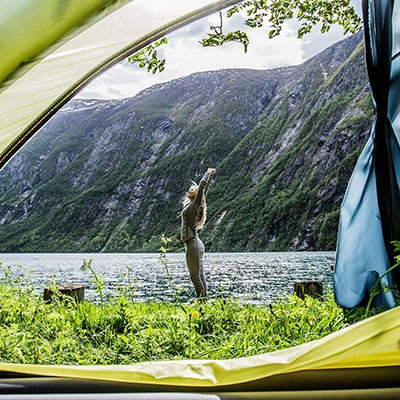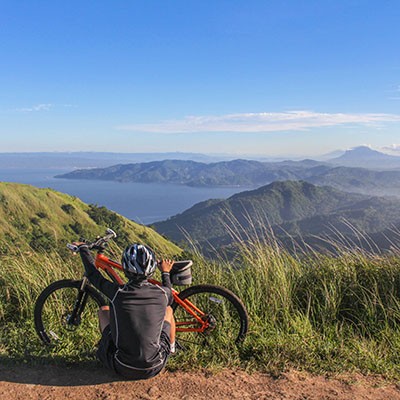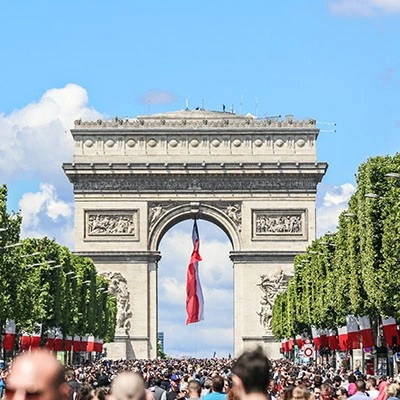Alternative tourism is your ticket to authentic travel experiences in Vietnam, away from crowded tourist traps. At SIXT.VN, we believe in responsible and immersive travel that benefits both you and the local communities. Discover unique cultural gems and breathtaking landscapes, making your journey truly unforgettable with our curated Vietnam travel services.
This guide explores the meaning of alternative tourism and how you can practice responsible travel. Let’s dive into ecotourism, cultural immersion, and off-the-beaten-path adventures, while also touching on the benefits of sustainable travel practices.
1. Understanding the Alternative Tourism Definition
Alternative tourism is a style of travel that focuses on experiencing destinations in a more authentic, sustainable, and responsible manner compared to mass tourism. It’s about moving away from crowded resorts and generic itineraries to embrace unique cultural encounters, support local communities, and minimize environmental impact.
Alternative tourism seeks to deliver experiences that are:
- Authentic: Immerse yourself in the local culture and traditions.
- Sustainable: Minimize the environmental footprint.
- Responsible: Support the local economy and community.
- Meaningful: Create enriching and memorable travel experiences.
According to a 2023 report by the United Nations World Tourism Organization (UNWTO), alternative tourism is gaining popularity as travelers seek more meaningful and impactful travel experiences. This trend reflects a growing awareness of the negative impacts of mass tourism and a desire to contribute positively to the destinations visited.
2. Why Choose Alternative Tourism in Vietnam?
Vietnam, with its diverse landscapes, rich history, and vibrant culture, is an ideal destination for alternative tourism. Choosing alternative tourism in Vietnam allows you to:
- Experience Authentic Culture: Engage with local communities, traditions, and customs for an immersive cultural experience.
- Support Local Economies: Contribute directly to local businesses and communities, ensuring that your tourism dollars benefit those who need them most.
- Minimize Environmental Impact: Explore Vietnam’s natural beauty responsibly, supporting eco-friendly practices and conservation efforts.
- Discover Hidden Gems: Venture off the beaten path to uncover unique and lesser-known attractions, creating unforgettable memories.
SIXT.VN can help you design the perfect alternative tourism experience in Vietnam, whether you’re interested in exploring remote villages, trekking through national parks, or learning about traditional crafts.
3. Key Principles of Alternative Tourism
 Man on his phone at train station.
Man on his phone at train station.
Alternative tourism is based on several key principles that guide travelers toward more responsible and sustainable practices. By embracing these principles, you can ensure that your travel experiences are both enriching and beneficial to the destinations you visit.
3.1. Respect for Local Culture
Respecting local culture is paramount in alternative tourism. This involves being mindful of local customs, traditions, and social norms, and demonstrating a genuine interest in understanding and appreciating the unique aspects of each community.
- Learn About Local Customs: Before you travel, take some time to research the local customs and etiquette of your destination.
- Dress Appropriately: Dress modestly and respectfully, especially when visiting religious sites or rural areas.
- Engage with Locals: Interact with locals respectfully, showing genuine interest in their lives and perspectives.
- Support Local Artisans: Purchase locally made products and handicrafts, supporting traditional skills and livelihoods.
3.2. Environmental Sustainability
Environmental sustainability is a core principle of alternative tourism, aimed at minimizing the negative impact of tourism on the natural environment. This includes reducing carbon emissions, conserving natural resources, and protecting biodiversity.
- Reduce Your Carbon Footprint: Choose eco-friendly transportation options, such as trains, buses, or bicycles, and consider offsetting your carbon emissions.
- Conserve Water and Energy: Be mindful of your water and energy consumption, especially in areas where resources are scarce.
- Avoid Single-Use Plastics: Bring your own reusable water bottle, shopping bag, and toiletries to reduce plastic waste.
- Support Eco-Friendly Accommodations: Choose hotels and guesthouses that have implemented sustainable practices, such as energy-efficient lighting and water conservation measures.
3.3. Economic Benefits for Local Communities
Alternative tourism seeks to ensure that tourism activities generate economic benefits for local communities, rather than primarily benefiting large corporations or foreign investors. This involves supporting local businesses, hiring local guides, and purchasing locally made products.
- Support Local Businesses: Patronize local restaurants, shops, and markets, ensuring that your money stays within the community.
- Hire Local Guides: Engage local guides who can provide authentic insights into the culture, history, and natural environment of the destination.
- Purchase Locally Made Products: Buy handicrafts, souvenirs, and other products that are made locally, supporting traditional skills and livelihoods.
- Negotiate Fair Prices: Be respectful when negotiating prices, and avoid haggling excessively, which can undermine local businesses.
3.4. Ethical Considerations
Ethical considerations are integral to alternative tourism, encompassing respect for human rights, animal welfare, and fair labor practices. This involves avoiding activities that exploit or harm people, animals, or the environment.
- Respect Human Rights: Avoid activities that could contribute to human trafficking, child labor, or other forms of exploitation.
- Protect Animal Welfare: Choose animal-friendly activities, such as wildlife watching in natural habitats, and avoid activities that exploit or harm animals.
- Support Fair Labor Practices: Patronize businesses that provide fair wages and working conditions for their employees.
- Avoid Supporting Harmful Industries: Avoid activities that could contribute to environmental degradation, such as deforestation or pollution.
4. Types of Alternative Tourism Experiences in Vietnam
Vietnam offers a wide range of alternative tourism experiences that cater to different interests and preferences. Whether you’re interested in exploring remote villages, trekking through national parks, or learning about traditional crafts, there’s something for everyone.
4.1. Ecotourism in Vietnam
 Woman stretching at camp site.
Woman stretching at camp site.
Ecotourism is a type of alternative tourism that focuses on exploring natural environments while minimizing environmental impact and supporting conservation efforts. Vietnam is home to numerous national parks, nature reserves, and protected areas that offer excellent opportunities for ecotourism.
- Cuc Phuong National Park: Explore Vietnam’s oldest national park, home to diverse flora and fauna, including rare primates and bird species.
- Phong Nha-Ke Bang National Park: Discover stunning caves, underground rivers, and karst landscapes in this UNESCO World Heritage Site.
- Cat Tien National Park: Trek through lush rainforests, spot wildlife, and learn about conservation efforts in this biodiversity hotspot.
- Pu Luong Nature Reserve: Hike through picturesque valleys, rice terraces, and ethnic minority villages in this remote and unspoiled region.
According to the Vietnam National Administration of Tourism (VNAT), ecotourism is a growing sector in Vietnam, with increasing numbers of travelers seeking sustainable and nature-based experiences.
4.2. Community-Based Tourism
Community-based tourism (CBT) is a type of alternative tourism that involves local communities in the planning, management, and operation of tourism activities. CBT aims to empower local communities, generate income, and preserve cultural heritage.
- Sapa: Stay in homestays, trek through rice terraces, and learn about the cultures of the Hmong, Dao, and other ethnic minority groups.
- Mai Chau: Explore traditional villages, cycle through scenic valleys, and participate in cultural activities with the White Thai community.
- Bac Ha: Visit the vibrant Sunday market, where ethnic minority groups from the surrounding region come to trade goods and socialize.
- Kon Tum: Discover traditional stilt houses, communal houses, and cultural practices of the Bahnar, Jarai, and other indigenous groups.
4.3. Voluntourism in Vietnam
Voluntourism combines travel with volunteer work, allowing travelers to contribute to local communities while gaining unique cultural experiences. Vietnam offers various voluntourism opportunities in areas such as education, healthcare, and environmental conservation.
- Teaching English: Volunteer to teach English in schools or community centers, helping to improve educational opportunities for local children.
- Healthcare: Assist in healthcare clinics or hospitals, providing medical assistance and support to underserved communities.
- Environmental Conservation: Participate in reforestation projects, beach cleanups, or wildlife conservation efforts.
- Construction: Help build or renovate schools, homes, or community centers in rural areas.
Before engaging in voluntourism activities, it’s important to research the organizations and projects carefully to ensure that they are ethical, sustainable, and beneficial to the local community.
4.4. Cultural Immersion
Cultural immersion is a type of alternative tourism that focuses on experiencing and understanding the culture, traditions, and way of life of a particular community. Vietnam offers numerous opportunities for cultural immersion, such as:
- Cooking Classes: Learn to prepare traditional Vietnamese dishes, using fresh, local ingredients.
- Craft Workshops: Participate in craft workshops, learning traditional skills such as weaving, pottery, or lacquerware.
- Traditional Music and Dance Performances: Attend traditional music and dance performances, showcasing the rich cultural heritage of Vietnam.
- Homestays: Stay in homestays with local families, experiencing their daily lives and customs firsthand.
4.5. Adventure Travel
 Man overlooking beautiful view with his bike.
Man overlooking beautiful view with his bike.
Adventure travel combines outdoor activities with cultural experiences, allowing travelers to explore Vietnam’s natural beauty while engaging with local communities. Vietnam offers a wide range of adventure travel opportunities, such as:
- Trekking: Hike through national parks, mountains, and valleys, experiencing the natural beauty of Vietnam on foot.
- Cycling: Cycle through scenic countryside, visiting villages, rice terraces, and historical sites.
- Kayaking: Explore rivers, lakes, and coastal areas by kayak, discovering hidden lagoons and caves.
- Rock Climbing: Challenge yourself with rock climbing adventures in Halong Bay, Cat Ba Island, or other scenic locations.
5. How to Plan an Alternative Tourism Trip to Vietnam with SIXT.VN
Planning an alternative tourism trip to Vietnam can be both exciting and rewarding. With SIXT.VN, you can create a personalized itinerary that aligns with your interests, values, and budget.
5.1. Define Your Interests and Values
Start by defining your interests and values. Are you passionate about environmental conservation, cultural preservation, or community development? Do you prefer exploring natural landscapes, engaging with local communities, or learning about traditional crafts?
5.2. Research Destinations and Activities
Research destinations and activities that align with your interests and values. Explore Vietnam’s national parks, ethnic minority villages, cultural sites, and volunteer opportunities. Consider the environmental impact, social responsibility, and economic benefits of each activity.
5.3. Book Eco-Friendly Accommodations
Choose eco-friendly accommodations that have implemented sustainable practices, such as energy-efficient lighting, water conservation measures, and waste reduction programs. Look for hotels, guesthouses, or homestays that are committed to environmental sustainability and social responsibility.
5.4. Support Local Businesses
Patronize local restaurants, shops, and markets, ensuring that your money stays within the community. Purchase locally made products and handicrafts, supporting traditional skills and livelihoods. Hire local guides who can provide authentic insights into the culture, history, and natural environment of the destination.
5.5. Respect Local Culture
Learn about local customs and etiquette, dress appropriately, and engage with locals respectfully. Show genuine interest in their lives and perspectives, and avoid behaviors that could be offensive or disrespectful.
5.6. Minimize Environmental Impact
Reduce your carbon footprint by choosing eco-friendly transportation options and offsetting your carbon emissions. Conserve water and energy, avoid single-use plastics, and dispose of waste responsibly.
5.7. Book Your Trip with SIXT.VN
Let SIXT.VN handle the logistics of your trip, including airport transfers, hotel bookings, tour arrangements, and travel advice. We can help you create a customized itinerary that aligns with your interests, values, and budget, ensuring a seamless and memorable alternative tourism experience in Vietnam.
6. The Benefits of Alternative Tourism
Alternative tourism offers numerous benefits for travelers, local communities, and the environment. By choosing alternative tourism, you can:
- Have More Authentic and Meaningful Experiences: Immerse yourself in the local culture, engage with local communities, and discover hidden gems that are off the beaten path.
- Support Local Economies: Contribute directly to local businesses and communities, ensuring that your tourism dollars benefit those who need them most.
- Minimize Environmental Impact: Explore Vietnam’s natural beauty responsibly, supporting eco-friendly practices and conservation efforts.
- Learn About Different Cultures: Gain a deeper understanding and appreciation of the culture, traditions, and way of life of the communities you visit.
- Make a Positive Impact: Contribute to the well-being of local communities and the environment, leaving a positive legacy behind you.
7. Common Misconceptions About Alternative Tourism
Despite its growing popularity, there are still some common misconceptions about alternative tourism. Let’s address some of these misconceptions:
- Alternative Tourism is Only for Backpackers: Alternative tourism is for anyone who wants to travel more responsibly and sustainably, regardless of their budget or travel style.
- Alternative Tourism is More Expensive: Alternative tourism can be more affordable than mass tourism, as it often involves supporting local businesses and choosing budget-friendly accommodations.
- Alternative Tourism is Only About Environmental Conservation: Alternative tourism encompasses a wide range of issues, including cultural preservation, community development, and ethical considerations.
- Alternative Tourism is Difficult to Plan: With the help of SIXT.VN, planning an alternative tourism trip to Vietnam is easy and convenient. We can handle all the logistics of your trip, ensuring a seamless and memorable experience.
8. Examples of Successful Alternative Tourism Initiatives in Vietnam
Vietnam is home to numerous successful alternative tourism initiatives that demonstrate the positive impact of responsible and sustainable tourism practices. Some examples include:
- Hoa Binh Community-Based Tourism Project: This project involves local communities in the planning and management of tourism activities in Hoa Binh province, generating income and preserving cultural heritage.
- Sapa O’Chau: This social enterprise provides sustainable tourism experiences in Sapa, employing local guides and supporting community development projects.
- Cuc Phuong National Park Ecotourism Program: This program promotes ecotourism activities in Cuc Phuong National Park, generating revenue for conservation efforts and local communities.
9. The Role of Technology in Alternative Tourism
Technology can play a significant role in promoting and facilitating alternative tourism. Online platforms, social media, and mobile apps can help travelers find eco-friendly accommodations, support local businesses, and connect with local communities.
- SIXT.VN Website: Our website provides information about alternative tourism destinations, activities, and accommodations in Vietnam, making it easy for travelers to plan their trips.
- Social Media: Social media platforms can be used to share information about alternative tourism initiatives, connect with like-minded travelers, and promote responsible travel practices.
- Mobile Apps: Mobile apps can provide access to local guides, maps, and transportation information, making it easier for travelers to explore destinations independently.
10. Sustainable Transportation Options in Vietnam
 Paris.
Paris.
Choosing sustainable transportation options is an important aspect of alternative tourism. In Vietnam, there are several sustainable transportation options available, such as:
- Trains: Vietnam’s railway network connects major cities and towns, offering a scenic and eco-friendly way to travel.
- Buses: Local buses are a budget-friendly and convenient way to travel between destinations, reducing carbon emissions compared to private vehicles.
- Bicycles: Cycling is a great way to explore local areas, visiting villages, rice terraces, and historical sites.
- Walking: Walking is the most sustainable way to explore cities and towns, allowing you to discover hidden gems and interact with local communities.
11. Tips for Responsible Dining in Vietnam
Choosing responsible dining options is an important aspect of alternative tourism. In Vietnam, you can support local communities and minimize environmental impact by:
- Eating at Local Restaurants: Patronize local restaurants and street food stalls, supporting local businesses and experiencing authentic Vietnamese cuisine.
- Buying Local Produce: Purchase fresh produce from local markets, supporting local farmers and reducing food miles.
- Avoiding Food Waste: Order only what you can eat, and avoid wasting food. If you have leftovers, take them with you or donate them to someone in need.
- Choosing Sustainable Seafood: Choose seafood that is sustainably sourced, avoiding overfished species and supporting responsible fishing practices.
12. How to Avoid Overtourism in Vietnam
Overtourism can have negative impacts on local communities, the environment, and the quality of travel experiences. To avoid overtourism in Vietnam, consider the following tips:
- Visit During Off-Peak Seasons: Travel during the shoulder seasons (spring and autumn) to avoid crowds and high prices.
- Explore Lesser-Known Destinations: Venture off the beaten path to discover hidden gems and support local communities in less-visited areas.
- Stay Longer in Each Destination: Spend more time in each destination, allowing you to immerse yourself in the local culture and contribute to the local economy.
- Support Local Businesses: Patronize local restaurants, shops, and markets, ensuring that your money stays within the community.
- Be Mindful of Your Impact: Be respectful of local customs and traditions, and minimize your environmental impact.
13. Essential Packing List for Alternative Tourism in Vietnam
Packing appropriately is essential for an alternative tourism trip to Vietnam. Here’s a suggested packing list:
- Lightweight Clothing: Pack lightweight, breathable clothing that is suitable for the warm and humid climate of Vietnam.
- Comfortable Shoes: Bring comfortable walking shoes or hiking boots for exploring cities, towns, and natural landscapes.
- Rain Gear: Pack a rain jacket or umbrella, as Vietnam experiences frequent rainfall, especially during the rainy season.
- Sun Protection: Bring sunscreen, a hat, and sunglasses to protect yourself from the strong sun.
- Insect Repellent: Pack insect repellent to protect yourself from mosquito bites, especially in rural areas.
- Reusable Water Bottle: Bring a reusable water bottle to reduce plastic waste.
- First-Aid Kit: Pack a basic first-aid kit with essential medications and supplies.
- Travel Adapter: Bring a travel adapter to charge your electronic devices.
- Phrasebook: Pack a Vietnamese phrasebook to help you communicate with locals.
14. Travel Insurance for Alternative Tourism in Vietnam
Travel insurance is essential for any trip, but it’s especially important for alternative tourism, which may involve outdoor activities, remote destinations, and potential health risks. Make sure your travel insurance policy covers:
- Medical Expenses: Coverage for medical treatment in case of illness or injury.
- Trip Cancellation: Reimbursement for trip expenses if you have to cancel your trip for a covered reason.
- Trip Interruption: Reimbursement for trip expenses if you have to interrupt your trip for a covered reason.
- Baggage Loss: Coverage for lost, stolen, or damaged baggage.
- Emergency Evacuation: Coverage for emergency evacuation in case of a medical emergency or natural disaster.
15. Staying Connected While Traveling Responsibly
While it’s important to disconnect from technology and immerse yourself in the local culture, staying connected can be useful for safety, navigation, and communication. Consider the following tips for staying connected while traveling responsibly:
- Purchase a Local SIM Card: Purchase a local SIM card for your smartphone, allowing you to access the internet and make phone calls at affordable rates.
- Use Wi-Fi Hotspots: Take advantage of free Wi-Fi hotspots in cafes, hotels, and public areas.
- Download Offline Maps: Download offline maps of your destination, allowing you to navigate without an internet connection.
- Communicate with Locals: Engage with locals and ask for directions or recommendations.
- Use Translation Apps: Use translation apps to communicate with locals who don’t speak your language.
16. Ethical Photography in Vietnam
 Venice.
Venice.
Photography is a great way to capture memories and share your travel experiences with others. However, it’s important to practice ethical photography, respecting the privacy and dignity of local people. Consider the following tips:
- Ask for Permission: Always ask for permission before taking photos of people, especially in rural areas or religious sites.
- Respect Cultural Norms: Be mindful of cultural norms and avoid taking photos that could be offensive or disrespectful.
- Avoid Exploitative Photography: Avoid taking photos that exploit or objectify people, especially children or vulnerable individuals.
- Share Your Photos Responsibly: Share your photos responsibly, avoiding stereotypes or misrepresentations of local cultures.
17. Learning Basic Vietnamese Phrases
Learning basic Vietnamese phrases can enhance your travel experiences and help you connect with locals. Here are some useful phrases:
- Xin chào: Hello
- Cảm ơn: Thank you
- Tôi không hiểu: I don’t understand
- Bạn có nói tiếng Anh không: Do you speak English?
- Bao nhiêu tiền: How much does it cost?
- Ở đâu: Where is…?
- Tạm biệt: Goodbye
18. Supporting Local Artisans and Craftspeople
Supporting local artisans and craftspeople is an important aspect of alternative tourism. In Vietnam, you can support traditional skills and livelihoods by:
- Purchasing Locally Made Products: Buy handicrafts, souvenirs, and other products that are made locally.
- Visiting Craft Villages: Visit craft villages, where you can see artisans at work and purchase their products directly.
- Participating in Craft Workshops: Participate in craft workshops, learning traditional skills such as weaving, pottery, or lacquerware.
- Negotiating Fair Prices: Be respectful when negotiating prices, and avoid haggling excessively, which can undermine local businesses.
19. Responsible Souvenir Shopping in Vietnam
Souvenir shopping can be a fun and rewarding part of your travel experience. However, it’s important to shop responsibly, avoiding products that could be harmful to the environment or exploit local communities. Consider the following tips:
- Buy Locally Made Products: Purchase souvenirs that are made locally, supporting traditional skills and livelihoods.
- Avoid Products Made from Endangered Species: Avoid buying products made from endangered species, such as ivory, rhino horn, or turtle shells.
- Choose Sustainable Materials: Choose souvenirs made from sustainable materials, such as bamboo, wood, or recycled materials.
- Avoid Buying Counterfeit Goods: Avoid buying counterfeit goods, which can harm local businesses and violate intellectual property rights.
20. Alternative Tourism Definition: Frequently Asked Questions
Here are some frequently asked questions about alternative tourism:
20.1. What is the difference between alternative tourism and mass tourism?
Alternative tourism focuses on authentic experiences, sustainability, and responsible travel, while mass tourism is characterized by large crowds, generic itineraries, and negative impacts on local communities and the environment.
20.2. Is alternative tourism more expensive than mass tourism?
Not necessarily. Alternative tourism can be more affordable than mass tourism, as it often involves supporting local businesses and choosing budget-friendly accommodations.
20.3. What are some examples of alternative tourism activities?
Examples of alternative tourism activities include ecotourism, community-based tourism, voluntourism, cultural immersion, and adventure travel.
20.4. How can I plan an alternative tourism trip?
You can plan an alternative tourism trip by defining your interests and values, researching destinations and activities, booking eco-friendly accommodations, supporting local businesses, respecting local culture, and minimizing your environmental impact. SIXT.VN can help you with all aspects of planning your trip.
20.5. What are the benefits of alternative tourism?
The benefits of alternative tourism include more authentic and meaningful experiences, support for local economies, minimized environmental impact, learning about different cultures, and making a positive impact.
20.6. Is alternative tourism only for backpackers?
No, alternative tourism is for anyone who wants to travel more responsibly and sustainably, regardless of their budget or travel style.
20.7. How can I minimize my environmental impact while traveling?
You can minimize your environmental impact by choosing eco-friendly transportation options, conserving water and energy, avoiding single-use plastics, and disposing of waste responsibly.
20.8. What is the role of technology in alternative tourism?
Technology can help travelers find eco-friendly accommodations, support local businesses, and connect with local communities.
20.9. How can I support local artisans and craftspeople?
You can support local artisans and craftspeople by purchasing locally made products, visiting craft villages, participating in craft workshops, and negotiating fair prices.
20.10. What should I pack for an alternative tourism trip?
You should pack lightweight clothing, comfortable shoes, rain gear, sun protection, insect repellent, a reusable water bottle, a first-aid kit, a travel adapter, and a phrasebook.
By embracing alternative tourism, you can create travel experiences that are both enriching and beneficial, leaving a positive impact on the destinations you visit and the communities you encounter. Let SIXT.VN be your guide to exploring the hidden gems and cultural treasures of Vietnam in a responsible and sustainable manner.
Vietnam awaits! Start planning your alternative tourism adventure with SIXT.VN today and discover a world of authentic experiences, cultural immersion, and responsible travel. Contact us now to learn more about our customized tour packages, airport transfer services, and hotel booking options.
Address: 260 Cau Giay, Hanoi, Vietnam
Hotline/Whatsapp: +84 986 244 358
Website: SIXT.VN



